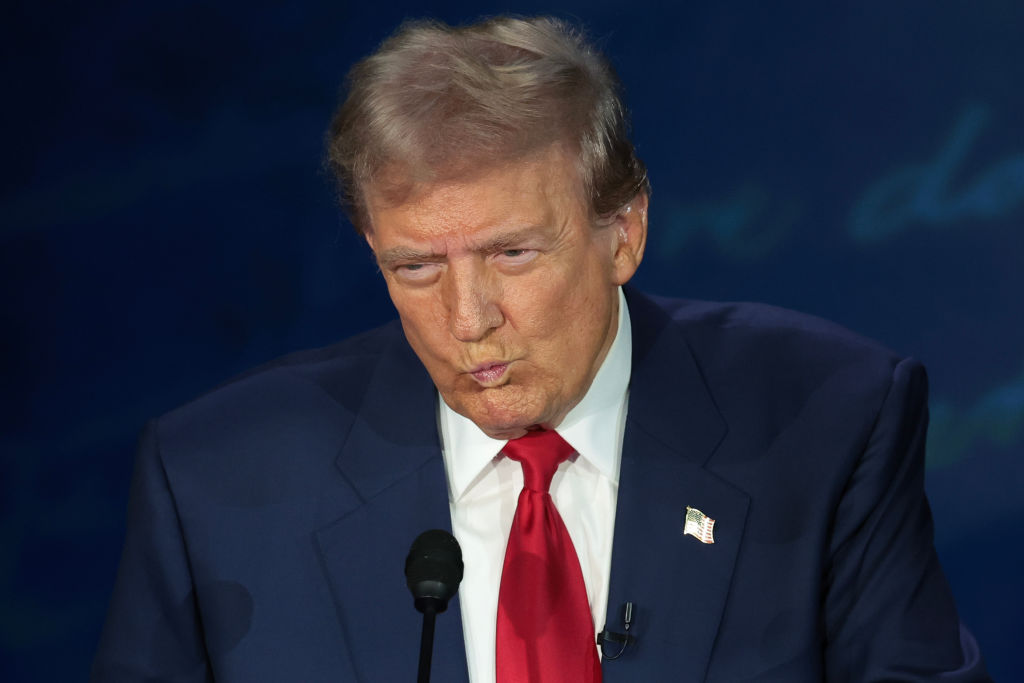Donald Trump’s debate performance against Kamala Harris on Tuesday night will be remembered almost entirely for a statement that would have been unthinkable just a decade ago. “They’re eating the dogs, the people that came in, they’re eating the cats,” the Republican candidate declared, referring to social media rumours about the dietary preferences of Haitian immigrants in Ohio.
This moment encapsulates the current ecosystem of Right-wing ideas and their propagation. What began as a handful of vague posts on the fringes of the internet has become the most memorable talking point in a presidential debate, eagerly leapt on by the former president. Trump has historically been no stranger to amplifying fringe theories. But in 2024, the Right-wing rumour mill operates at warp speed.
The contrast with Trump’s dismissive attitude towards the Heritage Foundation’s Project 2025 couldn’t be starker. When Harris brought up this interesting and comprehensive conservative policy blueprint, Trump claimed to have “nothing to do with it” and said he hadn’t even read it. This juxtaposition tells the story: the MAGA base is more energised by and receptive to provocative, easily-shareable content than dense policy proposals, even those crafted by the best and brightest at conservative think tanks.
This pattern in communication on the Right can be traced through the spread of the pet-eating meme. It began with vague social media posts, including a fourth-hand story in a Facebook group about local crime. These unverified claims were then given a wider audience at public meetings, where residents spoke about violence against animals without providing evidence. Despite repeated statements from Springfield police and the city’s mayor that there were no credible reports of such incidents, the rumour gained enough traction to be picked up by prominent Republicans, with Ohio Senator and vice-presidential nominee J.D. Vance — a heavy social media user — pointing to these claims as evidence of immigrant-induced chaos.
This bottom-up flow of information, from internet forums to the debate stage, has supplanted traditional top-down policy dissemination. It’s a far cry from the days when conservative think tanks like the Heritage Foundation could shape the Republican agenda through considered policy proposals such as the 1994 midterm election-defining Contract with America. Now, the currency of ideas is increasingly measured in shares and retweets rather than policy papers and institutional endorsements.
Of course, this phenomenon isn’t limited to the American Right, but it is here that it is most acute. Trump’s debate performance, meanwhile, wasn’t just a personal quirk, but a window into the transforming grassroots conservative landscape. This shift has been building for years: in Nevada this June, Trump pushed another unverified claim about the January 6 riots, saying: “All they were doing is protesting a rigged election. And then the police say, ‘Go in, go in’ to the Capitol,” he said of his supporters. “What a set-up that was.”
This statement, like the pet-eating rumour, flies in the face of established facts. Nearly 140 law enforcement officers were injured trying to keep protesters out of the US Capitol that day, according to official reports. Outside of the usual gamesmanship and political gerrymandering that precedes every trip to the polls, there’s no evidence the 2020 election was “rigged” or that Trump supporters were the victims of an FBI “set-up”. Yet these claims continue to gain traction within certain conservative circles.
As we move deeper into the 2024 election cycle, Trump’s viral comments remind us that the traditional gatekeepers of Right-wing thought — think tanks, policy wonks and establishment figures — have been sidelined in favour of a more decentralised, internet-driven approach to spreading ideas.
For better or worse, this is the new reality of conservative politics in America. The pet-eating rumour’s bottom-up journey from social media to the presidential debate stage is just one example of how this system works. If Trump can make it work for him once more — and polls have tightened recently, even if most show Harris “prevailing” in the debate — then we may be facing a sea change in how American democracy functions, from policy formation to the very mechanisms of governance itself.











Join the discussion
Join like minded readers that support our journalism by becoming a paid subscriber
To join the discussion in the comments, become a paid subscriber.
Join like minded readers that support our journalism, read unlimited articles and enjoy other subscriber-only benefits.
Subscribe